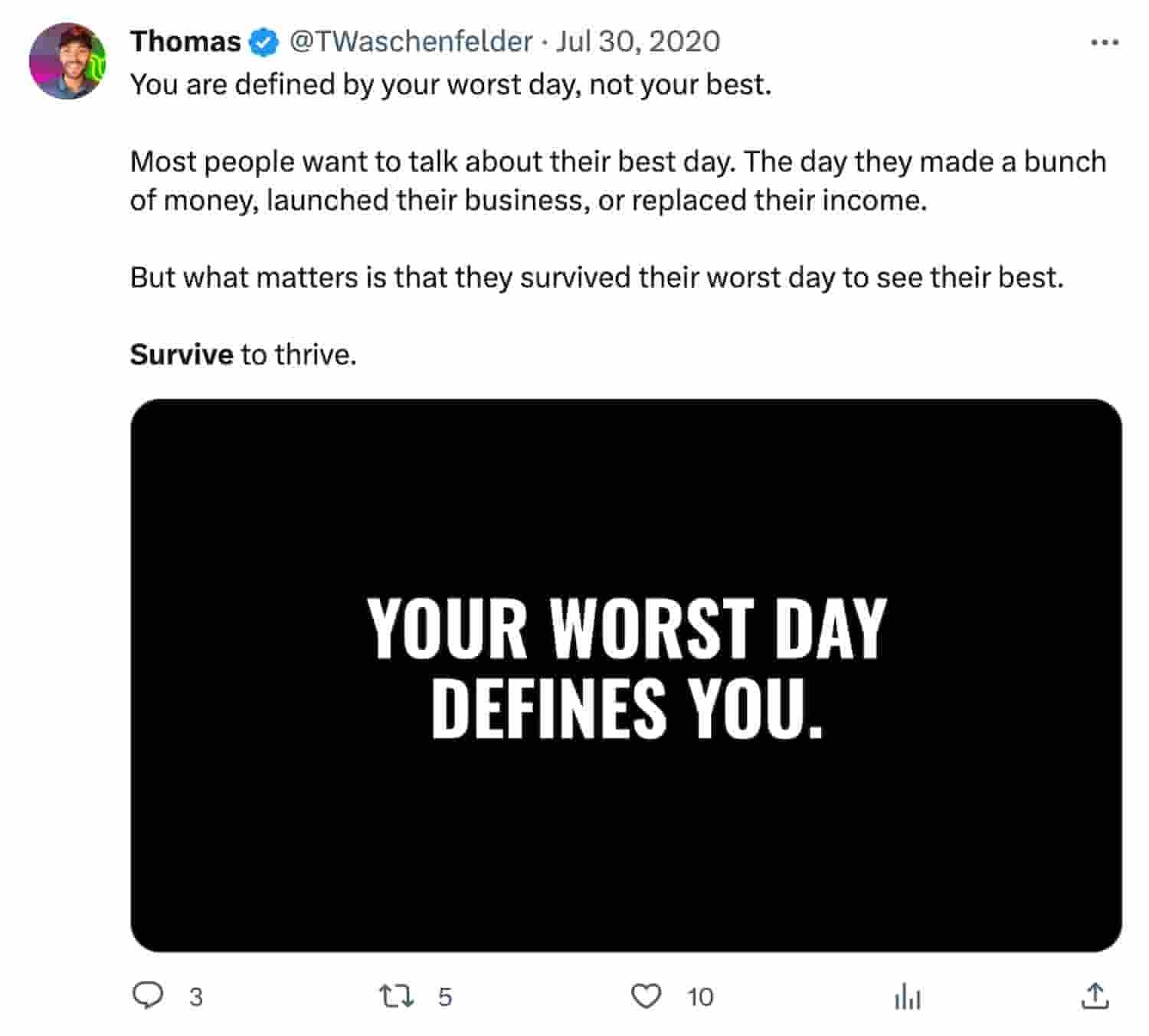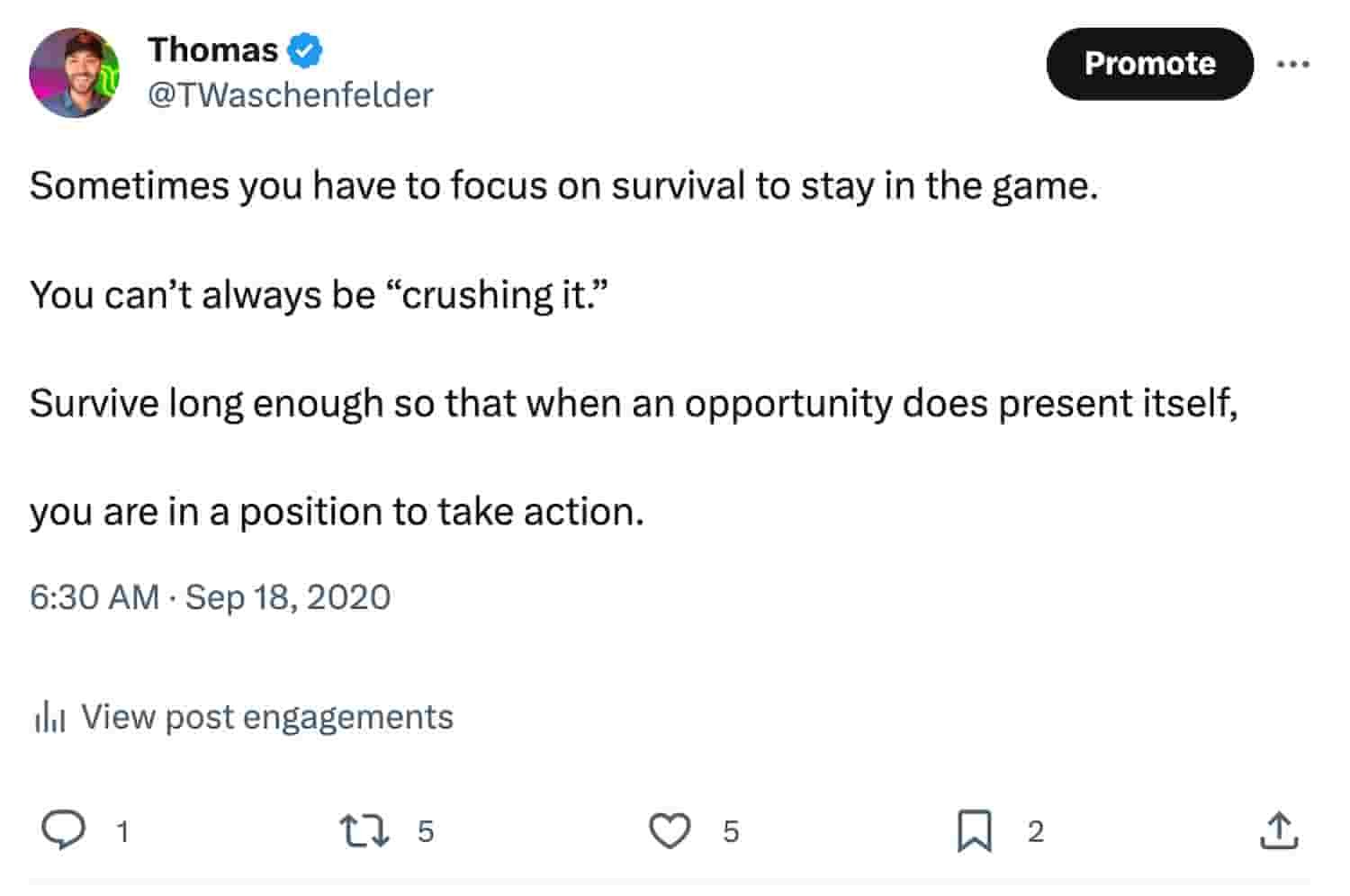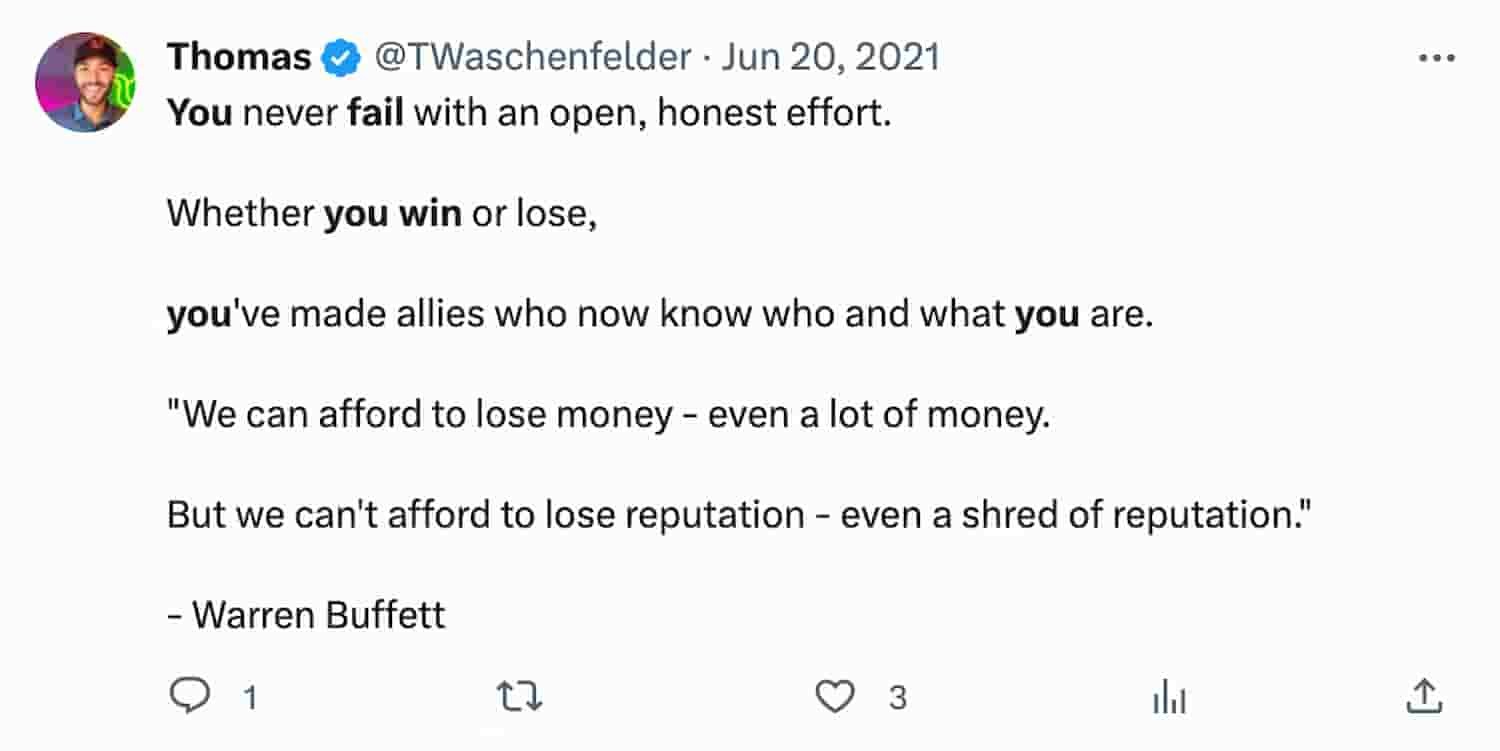Survivorship Bias: Why You Only Care About The Winners
In life, we rarely talk about the “losers.” Newspapers don’t report on what didn’t happen, finance gurus on Twitter don’t talk about the times they failed, and no one writes deep analysis on all the companies that quickly went bankrupt.
This is because of survivorship bias. We focus on what we can see (the winners), and ignore what we can’t see (the losers). And it seriously distorts our ability to calculate the odds of something happening.
What is survivorship bias?
Survivorship bias is a cognitive shortcut that makes you ignore everything that didn’t survive some kind of selection process, focusing instead on only the “winners” in a particular field.
The next time you take a walk outside, look at the trees in your neighborhood. Then, try and consider all the trees you don’t see - the ones that didn’t survive the evolutionary process and are now extinct.
It’s not easy, is it? There are far more species of trees that have gone extinct than ones that haven’t, yet we never consider the beauty of the ones we don’t see. That’s survivorship bias.
Here’s Nassim Nicholas Taleb defining survivorship bias in his (excellent) book, Fooled By Randomness:
“In a nutshell, the survivorship bias implies that the highest performing realization will be the most visible. Why? Because the losers do not show up… The mistake of ignoring the survivorship bias is chronic, even (or perhaps especially) among professionals. How? Because we are trained to take advantage of the information that is lying in front of our eyes, ignoring the information that we do not see.”
All around you, you only see winners. When you’re watching movies or YouTube or Twitch, you’re watching the actors who got the part, the creators who were boosted by the algorithm, and the gamers who made it big.
Everything else is hidden - the losers don’t show up.
Survivorship Bias Makes Us Feel Good.
There’s a simple reason we all lean into survivorship bias. Stories of survival and victory - like the tech founder who struggled for a decade before landing their billion-dollar payout - make us feel good about our chances for success.
The reality is that most businesses fail. Most actors are broke. Most “creators” in the creator economy don’t make any money.
No one wants to hear this, and who can blame them!
BUT, if you can leave behind your emotional response to these facts and start to notice this shortcut in your thinking, you can use it to help you in decision-making, not hurt you.
Examples of Survivorship Bias
American Bombers In WWII
One of the most popular stories of survivorship bias played out during World War II and involves a mathematician named Abraham Wald.
During the war, American Bombers were getting hammered by German counter-air defense. The U.S. military was wondering how they could improve the survivability rate of their bombers.
In other words, where could they reinforce their planes to make them more robust to damage?
And they had data they could use to inform their decision. Here’s an image of the damage the planes took that survived to return to American bases:
Location of the hits in the aircraft. McGeddon, CC BY-SA 4.0, via Wikimedia Commons
As legend has it, Abraham Wald’s great insight was that the military shouldn’t be focused on protecting the areas of the red dots in the image above - the areas where the surviving planes took damage.
Instead, the military should protect the areas of the planes that took damage and then didn’t return home.
Here’s an excerpt of Wald’s analysis:
“What you should do is reinforce the area around the motors and the cockpit. You should remember that the worst-hit planes never come back. All the data we have come from planes that make it to the bases. You don’t see that the spots with no damage are the worst places to be hit because these planes never come back.”
Wald was able to consider that data he couldn’t see - the planes that didn’t survive and return home - and then make an informed decision to help the military in the war.
Product And Book Reviews
Everyone reads reviews for products they buy on Amazon. But very few people stop to consider what people haven’t written in those reviews. Or, how many people bought the product and didn’t leave a review at all.
Taleb explains his own vulnerability to survivorship bias when it comes to book reviews. He writes in Fooled By Randomness:
“I tend to confuse a book review, which is supposed to be an assessment of the quality of the book, with the best book reviews, marred with the same survivorship biases. I mistake the distribution of the maximum of a variable with that of the variable itself. The publisher will never put on the jacket of the book anything but the best praise. Some authors go even a step beyond, taking a tepid or even unfavorable book review and selecting words in it that appear to praise the book.”
When you read a product review, you are only reading what survived a specific filter to get there. It doesn’t tell the whole story.
The Careers of The Highly successful
No one writes an in-depth story on the talented actor who never made it big in Hollywood and eventually gave up.
The media doesn’t interview the dedicated, hard-working CEO of a newly bankrupt company.
No one makes an awesome YouTube video on the college athlete who sacrificed everything to make it pro and failed.
The overwhelming number of (often random) failures never make it to you.
Instead, we hear about the stories of the successful. And we correlate their success with the stuff they did - the sacrifices they made, the tools they used, the determination they had. We assume these were the factors that contributed to their success.
And this makes us feel that anyone can achieve that kind of success if they just put in the work.
It’s a comforting story, but it’s false.
Much of life is random. Many of these massive, outsized wins are as much to do with luck as they are to “habits of the rich.”
BUT, there are steps you can take to improve your chances of success and actually use survivorship bias to help you get there.
How To Combat Survivorship Bias
Seek Out Stories Of Failure.
To get a clear look at the odds of something happening without the allure of a really great story, seek out stories of failure.
Try and find out how many people started on the same path you’re considering, but didn’t make it.
Then learn as much as you can from their failures.
One book that’s great for this is called What I Learned Losing A Million Dollars. It’s honest and frank, and showcases the “psychological factors behind bad financial practices in several economic sectors.” That’s info you can use!
Because remember, some (if not most) successes are just random. Given a large enough sample size, you are bound to get people who win just by luck. Here’s Taleb again:
“We tend to think that traders were successful because they are good. Perhaps we have turned the causality on its head; we consider them good just because they make money. One can make money in the financial markets totally out of randomness.”
Make Bets Where Even if You Lose, You Win.
One thing became clear to me as I wrote this article:
If we don’t see most failures, and failure is far more likely than success, then we want to operate in areas where, even if we fail, we somehow win!
In some ways, that’s what my entire blog is about - positioning yourself for unlimited gains and limited losses. And there are some obvious places to look:
“New or rapidly developing industries, whether glamorous or not, very often provide more opportunities to get rich than established sectors. The three reasons for this are availability of risk capital, ignorance and the power of a rising tide.” - Felix Dennis
That’s where you want to compete - in new industries so you can find a way to win even if you “lose.”
Good luck, and thanks for reading.
If You Want More Ideas Like This, Follow Me On Twitter And Subscribe To My Newsletter:
SOURCES
Dennis, Felix. How to Get Rich: One of the World's Greatest Entrepreneurs Shares His Secrets. Penguin Publishing Group. Kindle Edition.
Taleb, Nassim Nicholas. Fooled by Randomness (Incerto) . Random House Publishing Group. Kindle Edition.





